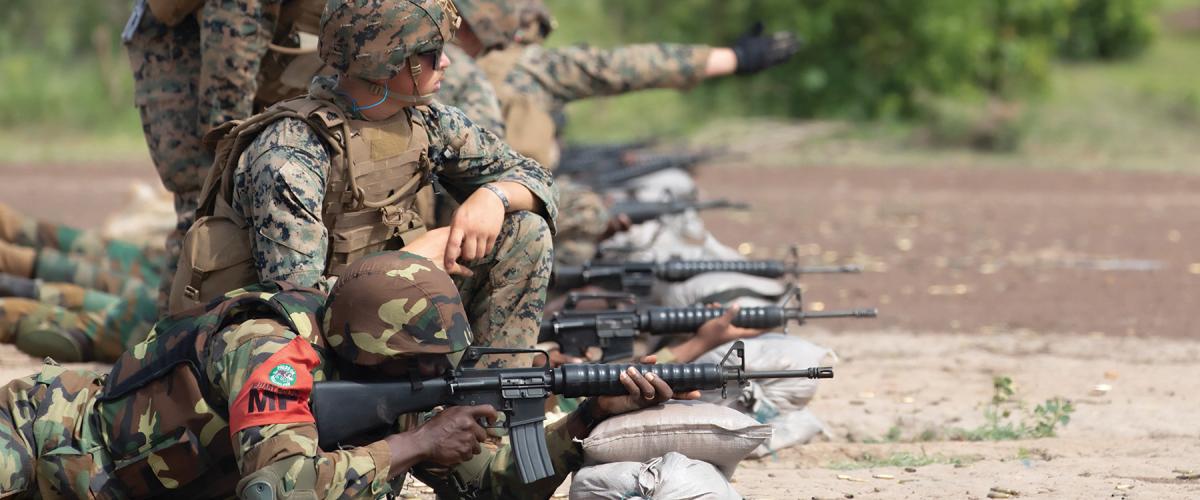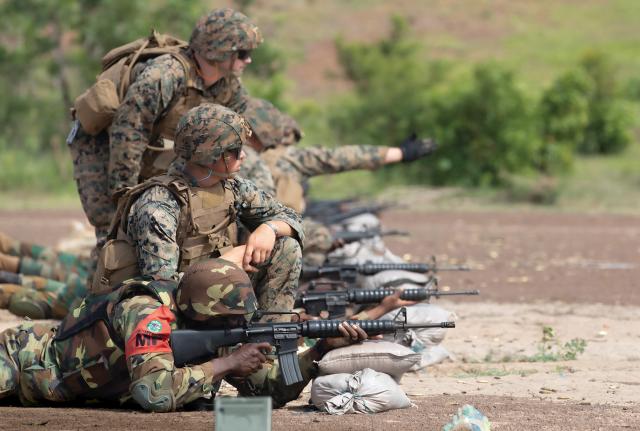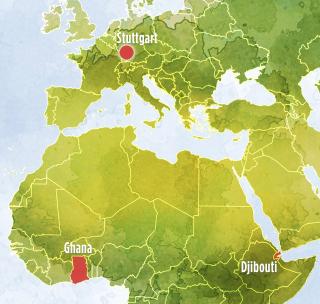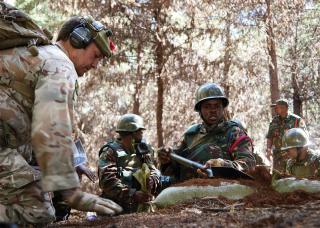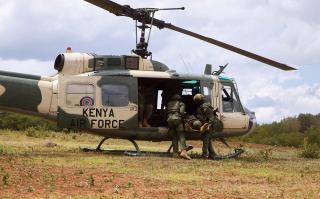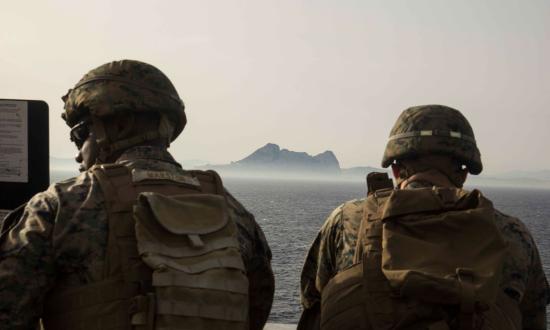U.S. Africa Command has a problem: it is not headquartered in Africa. The U.S. combatant command that oversees operations in the world’s second-largest and second-most populous continent is based in Stuttgart, Germany, more than 800 miles from African shores—a geographic and cultural distance that makes it ill-suited to direct U.S. operations in Africa.
Washington should negotiate an agreement to move Africa Command (AfriCom) headquarters to Africa to enhance its ability to cooperate with and support African nations and improve U.S. operations on the continent. The ideal candidate is Ghana, an ally with effective state institutions in a fragile region.
A Cooperative Command
Before 2007, European, Central, and Pacific Commands shared responsibility for African operations, but the global war on terror elevated Africa’s strategic importance. Instability, weak states, and ethnically and religiously complex societies created a welcoming climate for Islamic militants.1
AfriCom was formally established on 1 October 2007, sharing headquarters with European Command in Stuttgart. It was designed to focus on continental partnerships rather than direct application of U.S. military force. “This new command will strengthen our security cooperation with Africa” and “enhance our efforts to bring peace and security to the people of Africa and promote our common goals of development, health, education, democracy, and economic growth,” a White House press release stated. “We will work closely with our African partners to determine an appropriate location for this new command in Africa.”2 Unfortunately, there was poor communication regarding the U.S. rationale for the command and a cool reception from some African governments, and any plans to move the command were tabled.3 But from the beginning, AfriCom’s framers recognized that effective partnerships with African nations required the command to be based on the continent.
Why Move?
An Africa-based AfriCom could respond more quickly to events unfolding on the continent and would be better positioned to cooperate with African peers. U.S. commanders could be on the ground with their troops faster, improving command and control. Even in an age of instant communication, geography matters.
The 2022 National Defense Strategy affirms interoperability as the Department of Defense priority in Africa, stating that the United States will “orient our approach on the continent toward security cooperation” and work “by, with, and through” African partners to build stability.4 An AfriCom with headquarters on the continent could advance these goals by hosting African military and political leaders close to home, facilitating regular face-to-face collaboration.
Effective partnerships are built on mutual understanding and respect. Many African nations are kaleidoscopes of ethnicities, languages, and religions, all interacting over long arcs of time. The U.S. military must learn about Africa’s nations and peoples—and it cannot do that effectively if the relevant command is a continent away. Moving AfriCom’s headquarters would show that Washington views African nations as important partners who warrant close cooperation and whose affairs merit seriousness.
Criteria for an Effective Headquarters
There are a few criteria for an ideal location for a geographic command headquarters:
Central Geography. Headquarters should be located near the center of the area of responsibility to improve both command and control of units and cooperation with regional governments.
Infrastructure for a Base of Operations. Colocating a command headquarters with a base of operations streamlines U.S. efforts, improves communication between the command and operating units, and reduces costs. An effective base of operations should be located in an area with road and rail links to the rest of the nation, an airport, and a seaport for naval operation and maritime supply. Host-nation government and military presence is desirable to facilitate in-person communication.
Linguistic Compatibility. A base in an English-speaking nation would improve the Department of Defense’s ability to coordinate everything from host-nation agreements to construction and maintenance issues with its hosts.
Stability. The command’s headquarters should be in a peaceful nation with an effective government.
Democracy. The United States’ most valuable asset abroad may be its identification with democracy. Choosing a democratic nation as host would communicate U.S. support of popular sovereignty.
The Case for Ghana
Using the above guideposts, the search narrows, with Ghana as the clear choice.
Ghana, in the heart of West Africa, has been an island of stability and democracy in a turbulent region. It has been democratically governed since 1993, and except for a period of interethnic fighting in the mid-1990s, has been peaceful.5 Its official language is English, and it has the second-largest economy in West Africa. It has participated in peacekeeping operations and limited military interventions and has approached NATO regarding potential cooperation.6 In 2018, Ghana and the United States signed a defense agreement that gives U.S. forces access to Ghanaian runways and radio channels in exchange for military training and equipment.7
Two locations in Ghana could be ideal host cities for AfriCom headquarters. Tema, Ghana’s premier port city, is less than an hour’s drive from the capital, Accra, to which it is also connected by rail. This offers great potential for cooperation with Ghana’s government. Tema also hosts units from the Ghanaian Army and Navy.
The second option is the twin cities of Sekondi and Takoradi, about a five-and-a-half-hour drive from Accra. They have both a port and a domestic airport, as well as rail connections to the east and north. They also have a strong Ghanaian military presence, hosting units from all three branches of Ghana’s armed forces.
Moving to Ghana is not without risks. Building the infrastructure for a combatant command would be costly. And while Accra and Washington maintain good relations, not everyone in Ghana would support an expanded U.S. presence: The 2018 defense agreement sparked protests in the capital.8 There also is a separatist movement in the easternmost region, although the low-intensity conflict between it and the state has resulted mainly in arrests. Ghana has avoided the conflicts and chaos that have plagued so many of its neighbors, but that does not mean it is immune.
Nevertheless, Ghana offers a strategically valuable location and cities linked by infrastructure and is without the ills of authoritarianism, instability, and misgovernance that bedevil so many African nations.
What about Djibouti?
The United States could save money and avoid the risks of the unknown by instead investing in Camp Lemonnier, Djibouti. Camp Lemonnier is well-placed to monitor and affect events in the Horn of Africa and the Arabian Peninsula. Djibouti sits on the western side of the narrow strait connecting the Red Sea to the Gulf of Aden, and Camp Lemonnier is adjacent to the international airport in Djibouti City. U.S. forces have been operating from the camp since 2003, and in 2014, the White House reached an agreement to extend the lease by 20 years, with options for a 10-year extension.9
But the location has drawbacks. Camp Lemonnier is small, and based on previous negotiations, it would be costly to expand. Djibouti is far from the Maghreb, Western Sahel, and the Gulf of Guinea, regions in which instability is the most pernicious and thus warrant the most attention from the Department of Defense. Djibouti’s official languages are Arabic and French, complicating communication, and the nation is surrounded by war-torn neighbors. Freedom House ranks it as one of the least free countries in the world based on citizens’ political rights and civil liberties.10 But the greater problem is that, since 2017, Djibouti has been hosting a People’s Liberation Army Navy base less than a half-hour drive from Camp Lemonnier.11 Djibouti’s willingness to billet U.S. and Chinese troops shows a mercenary-like approach to dealing with other powers—not the foundation for a long-lasting partnership.
Washington may wish to maintain a presence in Djibouti, but it should not be the home for AfriCom.
Too Important to Ignore
Testifying before the Senate Armed Services Committee in March 2024, AfriCom Commander General Michael Langley noted:
Africa’s critical minerals and maritime shipping lanes become more important to America’s technological and energy independence every day. . . . America’s fastest-growing partners for trade, space exploration, and scientific exchange are in Africa, and its young and fast-growing populations are the key to safeguarding the global rules-based order. . . . If we fail in Africa, our strategic competitors will move in. If we succeed, so do the peoples of Africa.
The United States cannot afford to ignore a continent wherein so much of the future lies. With Beijing and Moscow moving to integrate Africa’s markets with their economies and turn its governments into partners, Washington must develop AfriCom into a combatant command that can win allies and shape events. A European-based headquarters hobbles that effort.
The United States should act now to show Africans it seeks closer partnerships with them. Moving AfriCom headquarters to Africa would be a good start..
1. Andrew Gray and Kristin Roberts, “Bush Approves New Military Command for Africa,” Reuters.com, 9 August 2007.
2. The White House, “President Bush Creates a Department of Defense Unified Combatant Command for Africa,” press release, 6 February 2007.
3. Samuel Makinda, “Why AFRICOM Has Not Won Over Africans,” CSIS.org, 24 November 2007.
4. U.S. Department of Defense, 2022 National Defense Strategy of the United States of America (Washington, DC: 27 October 2022), 16.
5. Research Directorate, Immigration and Refugee Board, Canada, “Ghana: Conflict between the Konkomba and Nanumba Tribes and the Government Response to the Conflict (1994–September 2000),” UNHCR.org, 26 September 2000; and Isaac Haruna Ziaba, “How Can Ghana Address Calls for Independence in Western Togoland?” London School of Economics and Political Science, 2 November 2020.
6. NATO, “Deputy Secretary General welcomes Ghanaian Defence Minister at NATO Headquarters,” news release, 7 September 2021.
7. U.S. Department of State, “Agreement between the United States of America and Ghana,” State.gov, 9 May 2018.
8. Dionne Searcey and Eric Schmitt, “Deal with U.S. Military Sets off Protests in Ghana,” New York Times, 28 March 2018.
9. Eric Schmitt, “U.S. Signs New Lease to Keep Strategic Military Installation in the Horn of Africa,” New York Times, 5 May 2014.
10. Freedom House, “Djibouti,” FreedomHouse.org.
11. Charlotte Gao, “China Officially Sets Up Its First Overseas Base in Djibouti,” The Diplomat, 12 July 2017



